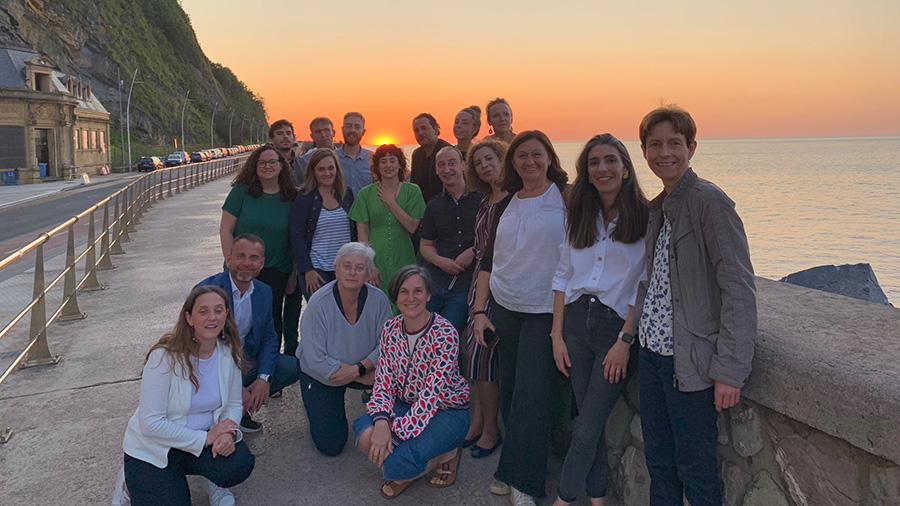Advancing the AO mission: ARI among SINPAIN project partners tackling next-generation knee osteoarthritis therapy

AO Research Institute Davos colleagues in attendance at the SINPAIN project kickoff in Spain, May 2022
The AO Research Institute Davos (ARI)—with its world-class research scientists and a unique, in-house cartilage bioreactor—is one of twelve partner institutions collaborating to develop a next-generation, advanced therapy for the most common chronic joint disorder worldwide: knee osteoarthritis.
No efficient treatment for knee osteoarthritis is currently available and new medications are needed to improve patients’ quality of life and reduce the high costs associated with the disease. The SINPAIN project, which got underway with a kickoff meeting two month ago in Spain, tackles those needs by taking advantage of the explosion of RNA technologies in recent years: The goal is to develop a safe,
efficient, and cost-effective therapy based on small interfering RNA (siRNA), combining RNA technology with improved intraarticular hyaluronic acid-based knee viscosupplement (IA-HA) containing tissue-engineering tools such as nanocarriers. Ultimately, the team aspires to develop more personalized diagnostic and treatment options for different stages of osteoarthritis.
SINPAIN receives a total of EUR 5.3 million from the European Union’s Horizon Europe program over the next four and a half years. Switzerland, where the AO is headquartered, is currently a non-associated third country in the Horizon European Program. ARI will receive CHF 639,000 from the Swiss State Secretariat for Education, Research and Innovation (SERI). Prof Zhen Li from ARI’s Regenerative Orthopaedics program will lead ARI’s SINPAIN project team comprising Drs Sibylle Grad and Sophie Verrier, with Dr Nunzia Di Luise providing administrative support.
ARI brings a unique advantage
Li explains that ARI was selected as a SINPAIN partner institution due to its unique, in-house cartilage bioreactor, which can culture living cartilage tissue and apply complex loading conditions simulating joint movement.
“In this project, ARI will establish 3D osteochondral coculture systems with chondrocytes-pericytes and chondrocytes-neurons that can be loaded within the cartilage bioreactor,” she says. “Nanotherapeutics functionalized with peptide and RNA will be tested in 3D osteoarthritis coculture models to validate their effect for inhibition of chondrocyte fibrosis and neuronal sprouting under inflammatory osteoarthritis conditions.”
Maximum preclinical relevance
ARI scientists will establish a complex ex vivo osteoarthritis model by combining bilayered polymer constructs, human cells from osteoarthritis patients, and the unique cartilage bioreactor to simulate the biomechanics of the human knee joint.
“As a bridge between in vitro and in vivo models, this system will bring the maximum preclinical relevance for therapy screening and optimal treatment selection,” she notes.
Osteoarthritis is one major cause of long-term disability among the elderly and a high disease burden, according the World Health Organization (WHO); these factors make it a research priority in the EU.
“Current pharmacological interventions consist of analgesics and anti-inflammatory drugs as well as intraarticular steroids and hyaluronic acid, with moderate efficacy and associated long-term side effects,” Li explains.
Aligned with the AO mission
Clearly, new medications are needed to alleviate pain and to slow progression of the disease, she says, and the SINPAIN project dovetails perfectly with the AO mission.
“SINPAIN aims to develop a pipeline of siRNA-based therapy—built on the combination of current technologies—that will be designed to achieve successful management of inflammation and innervation therapy for treatment of osteoarthritis of the knee,” says Li. “This project is very much in line with the AO mission of promoting excellence in patient care and outcomes in trauma and musculoskeletal disorders.”
Other SINPAIN partner institutions are the National Institute of Health and Medical Research (Inserm) and OZ Biosciences (OZB), France; Saarland University and EURICE – European Research and Project Office, Germany; Reykjavik University, Iceland; Università degli Studi del Piemonte Orientale (UPO), Italy; the Institute for Research and Innovation in Health (i3S), Portugal; Cidetec and Asphalion, Spain; the University of Liverpool, United Kingdom; and the University of California Board of Regents, United States.

